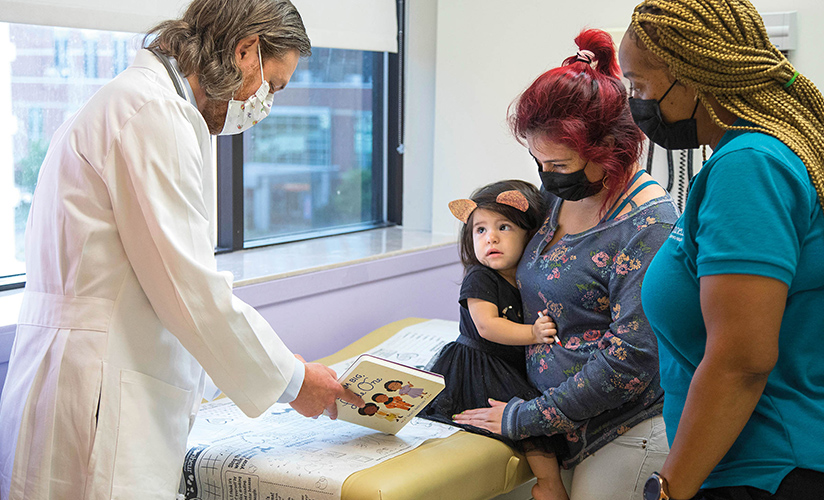Trauma-Informed Care
In its first year of operation, Le Bonheur’s Family Resilience Initiative (FRI) showed that of the 246 families enrolled in the program, more than half of caregivers reported one or more adverse childhood events (ACEs) for their child and a social determinants of health (SDOH) need according to research published in Clinical Pediatrics. The FRI program is a multidisciplinary collaborative that screens for ACEs and SDOH in Le Bonheur’s ULPS General Pediatrics Clinic and connects families with needed services to mitigate and prevent ACEs.
According to the Centers for Disease Control and Prevention, ACEs are potentially traumatic events that occur in childhood that can be emotionally painful or distressing and have effects that persist for years. Family and community supports can shape a child’s response to this trauma. Social determinants of health (SDOH) are defined by the World Health Organization as the non-medical factors that influence health outcomes. This includes the conditions in which people are born, work and live and the economic, social and political forces and systems that have impact on health equity.
“Adverse childhood experiences, including abuse, neglect and household dysfunction experienced prior to 18 years old, have been described as the public health emergency of our time,” said Jason Yaun, MD, division chief of Outpatient Pediatrics and medical director for FRI. “The primary care setting is an ideal place to screen for ACEs and SDOH and provide emerging and evidence-based interventions.”
FRI is embedded in the primary care setting and funded through a grant from the Urban Child Institute. Outreach coordinators screen patients ages 9 months to 5 years of age as a part of their well-child visit using the Accountable Health Communities (AHC) Health-Related Social Needs (HRSN) screening tool for SDOH and a modified version of the Pediatric ACEs and Related Life Events Screener (PEARLS) tool for identifying ACEs. Families that have a SDOH need or an ACE are enrolled in the FRI program. If SDOH are identified, the outreach coordinator connects the family with resources to meet their needs, and if any ACEs are identified free counseling is offered through a child psychologist embedded in the clinic. All families receive education and prevention strategies for ACEs. The outreach coordinators then communicate findings to the medical team and document ACEs and SDOH in the medical record. They continue to follow up with families via text, phone call, home visits or clinic visits based on intensity of needs. The FRI screening process is repeated with each family on an annual basis.

During the first year of intake, FRI had 246 participants, 92.3% of whom were black and 58.8% with an annual income of $15,000 or less. The primary results showed that 39.4% of families in the program reported ACEs and SDOH with 56.9% reporting at least one or more ACEs. Sixty-three percent of families reported at least one SDOH-related need.
Additional results included:
- The most common ACE reported was separation or divorce of parents/guardians (40.7%) followed by child living or having lived with a household member who was depressed, mentally ill or attempted suicide (13.4%).
- The average number of ACEs per patient was .94.
- 40 families (33.1%) received a referral for psychology services.
- The most common SDOH issues were around food insecurity (36.1%) followed by utility needs (19.6%) and transportation (18.4%).
- Outreach coordinators conducted a total of 2,240 follow-up activities.
“The successful design, implementation and experience of the FRI model, through one year of screening and enrollments, shows that the FRI model is a feasible approach to implement trauma-informed care,” said Yaun. “Addressing ACEs and SDOH in a primary care setting is the future of pediatrics.”
SDOH needs of patients practically impacts several aspects of patient care. Approaching care with a trauma-informed lens allows the clinic to view patients and families with empathy and probe into the root of the issue for anything from behavioral problems to appointment no-shows. They also can connect and be aware of how trauma and ACEs play into health-related problems like feeding, developmental and sleep issues.
“Our ultimate goals are to show that a program like this is feasible and sustainable in a primary care setting and demonstrate through patient metrics, including biological and developmental outcomes, how this program improves health and well-being for kids,” said Yaun. “Understanding how social determinants of health and ACEs impact children’s health makes the medical home the ideal place to screen for issues like these.”
Their research supports the evidence that ACEs are common from a young age which further emphasizes the need to mitigate effects of previous ACEs, while providing resiliency building and empowerment to prevent future ACEs. Next, the FRI program hopes to evaluate FRI interventions and impact on child development, health outcomes, health care utilization and more and potentially expand enrollment to adolescents.
Help us provide the best care for kids.
Le Bonheur Children's Hospital depends on the generosity of friends like you to help us serve 250,000 children each year, regardless of their family’s ability to pay. Every gift helps us improve the lives of children.
Donate Now













